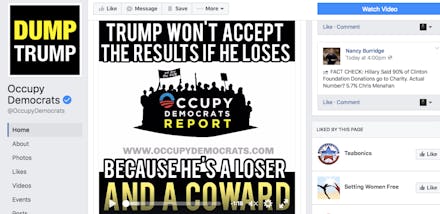Your favorite hyper-partisan Facebook pages are full of lies and bad information

Facebook is excellent at identifying our deeply held convictions and aggressively reinforcing them. If you're already nostalgic for the Bernie Sanders campaign, Occupy Democrats is ready with the memes you need to keep the #Berning passion in your soul extremely lit. If you believe that Donald Trump won the final debate, Freedom Daily will show you the "exact moment when Hillary realized Trump knocked her the hell out."
These sites are also chock full of lies, rumors and misinformation. A BuzzFeed analysis of some of the most prominent partisan Facebook groups illustrates how those pages publish false reports and factually inaccurate posts at a much higher rate than traditional news organizations. The three liberal pages they examined posted false information at a rate of 19%, while the three conservative sites they looked at post 38% false information.
In other words: These pages are full of shit.
But the most disturbing trend found in the report is that all of those lies really drive traffic. The report found that some of the worst offenses in terms of bad information were also the most viral successes for these pages.
BuzzFeed's deep dive into these pages also revealed the role of these pages in mainstreaming bad information that most sophisticated news operations would filter out. In once instance, both Occupy Democrats and the similarly liberal page The Other 98% posted a false story purporting that the U.S. surgeon general claimed that taking a drink every time Trump lied during the first presidential debate could result in "acute alcohol poisoning."
Both liberal and conservative pages were found to be responsible for bringing false reports and conspiracy theories to mainstream audiences of millions of interested Facebook users. Considering that, according to Pew Research, Facebook is now the primary source of political news for millennials, the rise of these Facebook pages is troubling to the integrity of the news landscape.
"This strange new class of media organization slots seamlessly into the news feed and is especially notable in what it asks, or doesn't ask, of its readers," the New York Times' Jon Herrmann wrote about the growing trend of hyper-partisan Facebook pages. "The point is not to get them to click on more stories or to engage further with a brand. The point is to get them to share the post that's right in front of them. Everything else is secondary."
That "everything else" happens to be the facts voters need in order to make informed decisions.